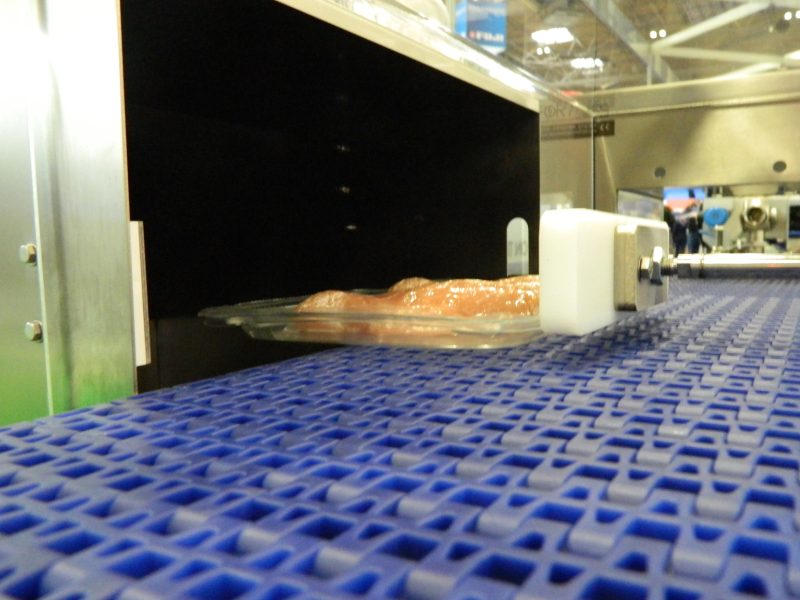START
Metal detection systems are still the best way to prevent contaminants from entering the food production chain. Fortress Technology, a food safety specialist has developed a retailer-spec conveyor system which meets all the requirements for product and application compliance.
The Fortress all in one Retail-Spec Conveyor meets all requirements of British Retail Consortium, HACCP or GFSI food safety standards. Among them are ARM microprocessing power, state-of-the art infeed, outfeed, and reject sensors.
Fortress customers know that purchasing a conveyor with fully integrated technology, including retailer Codes-of-Practice (COP), is a sure way to ensure that the metal detector performs at its best and meets all future inspection requirements.
Stay true to your Simple to use; smart under the hood Jaison Anand, sales manager, says that engineering principles are not the Fortress Retail Spec Conveyor’s primary focus. However, it is more about the size and configuration of the conveyor belts, but more about the placement smart sensors.
Brains are more important than brawn
Jaison describes the sensors in this way: “In our experience, food processors can feel overwhelmed by the breadth of inspection technology choices. Built to M&S Food standards, the rationale for creating our Retailer Spec Conveyor was to address this minefield and provide customers with future-proof functionality.” Fortress intentionally uses M&S food safety standards as the benchmark, as they are the most stringent, affirms Jaison.
Every step of the inspection process is monitored by machine sensors. Infeed sensors register the presence of each pack as it enters a Fortress-approved metal detector. If there’s no contamination trigger, the outfeed sensor identifies the pack leaving the metal detector, while the reject sensor will track the placement of potentially contaminated product into the BRC-approved bins. “It’s a seamless and failsafe process that uses our Contact software to register every sensor activity, fault fix and signal in parallel,” confirms Jaison.
ARM Processing is the only way to accomplish all these simultaneous activities. “The true benefit of ARM Processing comes from being able to run multiple inspection processes within milli-seconds of each other, without missing a beat. This is done with the highest precision, while also capturing and storing valuable processing data for traceability.”
For nut specialist Trigon Snacks, opting for a Fortress Stealth supermarket-spec conveyor metal detector fulfilled the company’s every inspection requirement. Retailer COPs specified that as ‘naked nuts’ the company’s honey-coated range must be inspected for metal contaminants prior to own-label packaging. Trigon also required a customized retailer specification metal detector, sensitive enough for the fine oil tolerances and sugar tolerances.
Keep to the code
Even though revisions to the Retailer COOP are rare, they can be a problem for food processors and machine manufacturers. Fortress is a cost-effective way to stay on top of evolving compliance and fault warning risks.
Software upgrades can be done as part a routine maintenance visit or validation visit to minimize interruptions to business. The menu and functional setup will look and feel the same from a continuity perspective.
For smarter machine monitoring and to support supply-chain traceability, the company’s suite of Contact software offers simple yet effective data capture. Contact 4.0 now includes remote monitoring of multiple metal detectors across the network. This software allows manufacturers to ensure HACCP compliance as well as traceable quality assurance recordkeeping. On-demand reports, event logging and data collection are all possible. All of this data is compiled from the information collected by the three machine sensors. The USB port located next to the HMI allows you to download and export reports.
Comparing the costs of purchasing a new machine versus a Fortress upgrade, Jaison remarks that it’s a no brainer. “You are typically looking at several hundred rather than tens of thousands of pounds buying new inspection kit. Most importantly for fast-paced food processing environments, compliance can be instant.”
Jaison explains that real-world changes to COPs should focus on failing safes and addressing machine misuse loopholes. There haven’t been any significant revisions assures Jaison for nearly seven years. “Nevertheless, we never take our eye off the ball. As soon as a new quality control or COP feature is added, Fortress R&D can be trusted to be on the upgrade case.”










